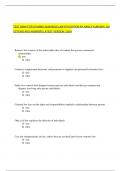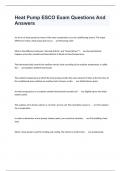TEST BANK FOR DYNAMIC BUSINESS LAW 6TH EDITION BY NANCY KUBASEK, QU
ESTIONS AND ANSWERS LATEST VERSION | 2024
Business law consists of the enforceable rules of conduct that govern commercial
relationships.
⊚ true
⊚ false
Contracts, employment decisions, and payments to suppliers are protected by business law.
⊚ true
⊚ false
Public law controls both disputes between private individuals and their government and
disputes involving only private individuals.
⊚ true
⊚ false
Criminal law lays out the rights and responsibilities implied in relationships between persons.
⊚ true
⊚ false
Only civil law regulates the behavior of individuals.
⊚ true
⊚ false
Case law interpretations are law, unless they are revoked later by new statutory law.
⊚ true
⊚ false
,The decision of a state supreme court is binding on a lower court that is located in the same
state.
⊚ true
⊚ false
Model or uniform laws are sources of law that are binding on courts.
⊚ true
⊚ false
Constitutions and statutes always cover all of the detailed rules that affect business and
government relations.
⊚ true
⊚ false
"Legal positivism" is also known as "natural law."
⊚ true
⊚ false
Miko comes to Jamal's law office to ask him about the law in regard to dogs running at largein
her neighborhood. Jamal tells Miko that he will research the issue and get back to her.
Where should Jamal look first in order to locate applicable law?
Restatements
State statutes
Case law
Uniform laws
Executive orders
,The president issued an executive order requiring that every citizen purchase a head of broccoli
to eat once a week in order to maintain health. The executive order was challenged and the
case went to the U.S. Supreme Court. The Supreme Court declared the executive order
could not be enforced because it was an abuse of the president’s power. What is the primary
source of law the Supreme Court would interpret to determine if the executive orderwas
enforceable?
The Constitution
State statutes
Case law
Uniform laws
Executive orders
In 1995, the was created to replace GATT.
United Nations
World Trade Organization
North American Free Trade Agreement
Nation to Nation Trading Organization
Nation’s Status on Trade
When you read a case, you should:
Find the facts, look for the issue, critically think about the issue, and determine if
your reasoning matches the reasoning of the judge.
Identify the legal issues, apply the facts to the legal issues, and evaluate the reasoningof
the judge in light of the facts of the case.
Consider the truth of the facts of the case, identify legal questions raised, review the
decision of the judge, and determine if the judge’s decision was justified by the rule
of law.
Find the facts, look for the issue, identify the judge’s reason and conclusion, locate the
rules of law that govern the reasoning, and apply critical thinking to the judge’s
reasoning.
Identify the facts, apply critical thinking skills to determine the truths of the facts, and
identify how the judge interpreted the facts in the case.
, Which areas of business law would a human resources manager find most relevant?
Contracts, employment and labor law, and employment discrimination
Contracts only
Contracts and labor law, but not employment discrimination
Employment and labor law, but not contracts
Human resource managers hold administrative positions and are not concerned with
areas of business law
Gardenia Abraham is a newly hired Production Manager for Stoneworks, Incorporated,
which manufactures wind turbines. As a new manager, Stoneworks sends Gardenia to
training so she can familiarize herself with laws that might impact her work. What laws
would most likely impact a production manager?
White collar crime, contracts, antitrust laws
Tort law, contracts, environmental law and consumer law
Antitrust law, contracts, intellectual property law
Property law, negotiable instruments, contracts
Consumer law, international law, employment law
Antonio and Veronica are arguing over who makes new federal law. Which of the following
entities is responsible for making new federal law?
State legislatures
Congress
Judges
The federal courts
The executive branch
If someone has failed to live up to a promise made to a business organization, the business
organization should:
Seek a legal remedy within the courts
Ask the lawmakers to impose a punishment upon the violator
Publicly shame the violator for breaking his promise
Turn to the executive branch to impose legal penalties
Ask lawmakers and the executive branch to impose consequences





